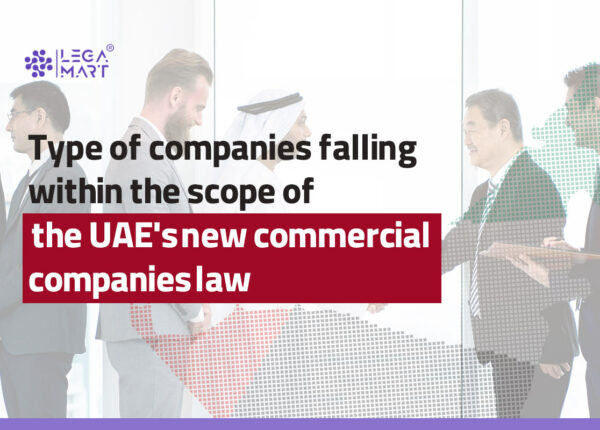The United Arab Emirates, commonly known as UAE, has emerged as one of the world’s biggest commercial hubs. The UAE is home to hundreds of multinational corporations today. Acting as a worldwide marketplace for traders and businesses of all scales, the UAE owes its rapid growth to several factors, such as its natural oil resources, an open economy, business policies drafted by its leaders, etc.
Recently the federation of seven nations observed its 50th birth anniversary, in honor of which the country has implemented various legislative reforms like UAE new commercial companies law. A central feature of these reforms is the new and amended commercial companies law. We are here to introduce new commercial companies laws you should know.
Introduction to the federal law no. 32 of 2021
The United Arab Emirates implemented many administrative and legislative reforms by introducing federal law no. 32 of 2021 on commercial companies as a vital feature of the legislative changes with a central Idea of promoting the UAE as a hub for foreign direct investment.
There are various aspects of the new commercial companies law you should know and understand if you want to conduct business or are a part of a company in UAE. Although these company laws can be complex and sometimes confusing, we at Legamart guide you through the complexities of the new law.
The New commercial companies law has come into effect since second January 2022, replacing federal law No. 2 of 2015 entirely and also codifying certain amendments made to the old companies law over the years. The new law brought about several changes, and all companies were given a transition period of 1 year to comply with the changes that had been introduced.
During this one year, the companies have to assess the results of the new companies law and update their constitutional documents with respect to it by 2nd January 2022.
Type of companies falling within the scope of the new commercial companies law

The New Commercial Companies Law 2021 (“CCL 2021”) broadly covers the same kind of companies as the 2015 regulation. Some of the most commonly encountered companies which the law has covered are:
- Limited Liability Companies (LLCs) – This company has at least 2 and a maximum of 50 partners. These companies are run either by a single manager or by a panel of managers. The appointed managers are responsible for carrying out certain obligations. Unless otherwise stated in the company’s memorandum of association, managers are provided the authority to act on behalf of the company so long as they have clarified the same to the third parties.
- Public Joint Stock Companies (PJSCs) – This company has at least 2 and a maximum of 200 shareholders. A collegial body of directors carries out the management for these companies. Here, the managers are regarded as trustees for the shareholders, and they have the obligation of defining the management structure of the company.
- Special Purpose Acquisition Companies (SPACs) – These form a type of public joint stock company which have been established for the sole aim of merging or acquiring another company.
- Special Purpose Vehicles (SPVs) – These forms of companies have the purpose of separating the assets and obligations of a specific financing arrangement from the assets and obligations of its parent company.
Certain companies have experienced an exemption under this new law. The exempt companies include companies that have already been exempt by any Cabinet Resolution, along with companies that the Federal or Emirate Government wholly owns and companies that operate in specific sectors (mainly power, gas, oil, and water desalination) along with having at least 25% of shares owned by Federal or Emirate Government. Further, companies previously exempt under CCL 2015 have also been carried forward under the new law.
It is also necessary to note that CCL 2021 does not apply to companies incorporated in the Abu Dhabi Global Market (ADGM) or the Dubai International Financial Centre (DIFC). Regarding companies within the free zone, it depends on the free zone in question to decide whether the company shall be covered within CCL 2021. However, the exemption shall not apply if the company in the free zone also operates onshore in the UAE.
Key features of the UAE new commercial companies law
UAE’s new commercial companies law has introduced significant changes affecting fields such as foreign investments, the question of ownership, corporate vehicles, limited liability companies, etc. The new law introduces two new corporate vehicles, a special purpose vehicle(SPV) and a special purpose acquisition company(SPAC). Some other changes to the new companies law will increase flexibility in certain areas, such as corporate governance and corporate reorganizations of limited liability companies (LLC) and public joint stock companies (PJSC).
The fundamental changes that have been introduced in the New Commercial Companies Law of UAE are as follows:
Foreign investments/ownership
The UAE New Companies Law that came into force on 2nd January 2022 allows foreign nationals to have 100% ownership in onshore companies. The amendment abolished the requirement for companies to have an Emirati shareholder or agent. The company ownership and foreign investments provisions are already incorporated into Federal Law No. 26 of 2020. However, federal law No. 32 of 2021 codifies these previous amendments.
In addition to the changes mentioned above, the new commercial companies law no longer requires companies to have a UAE national or a local company as registered agents. With the previous requirement of 51% shareholding of a UAE national gone, foreign investors can now fully establish a business in UAE, of course, except for certain “Activities of Strategic Effect.”
Special acquisition companies (SPACs)
A special purpose acquisition company is a company with no ongoing commercial operations. It is formed solely for raising capital through an IPO or acquiring or merging with an existing company. These are also known as blank check companies and have existed for quite some time.
The new commercial company law gave a legislative basis to the SPACs in the Emirates. Although SPACs have been popular in other parts of the world, such as the USA, as means to raise capital, etc., it was only after the introduction of new companies law that they were introduced in UAE.
The new commercial companies law defines these special acquisition companies as public joint stock companies (PJSCs). They have been approved by the securities and commodities authority has approved only for the purpose of mergers and acquistions of companies in UAE while also serving as another option to facilitate M&A activity such as foreign investments.
This signifies the commitment of the UAE to be a part of the growing overseas trend of IPOs, which is carried out using SPACs. Also, although the SPACs have been recognized and initiated by the new law, they are still exempted from it. They, therefore, are subject to separate regulations which were issued earlier.
Special purpose vehicles (SPV)
The new commercial companies law recognized the onshore special purpose vehicles for the very first time. The SPV is a type of company that exists to split the obligations and assets related to some specific financing operation of the parent entity or the obligation and assets of the person who incorporated it for any reasons such as credit operations, borrowing, securitization, issuance of bonds, etc.
Similar to SPACs, SPVs fall under the new companies act but are governed by separate regulations issued by the SCA.
The introduction of SPACs and SPVs is expected to stimulate transactions in the corporate and financing sectors by allowing greater flexibility in structuring and aligning the UAE with structures available to investors and financers in other developed jurisdictions.
Various provisions made related to limited liability companies (LLC)

A limited liability company is a form of a business structure that originated in the USA to protect the owners of the said company from any personal responsibility for the company’s debts.
The new commercial business law has introduced several provisions regarding LLCs:
Powers of the manager
A manager’s time in office may be prolonged by up to six months from the expiration date of their term or until the impending appointment of a new manager in cases where they have not been replaced.
Statutory reserves
The reduction of the statutory reserves derived from net profits, from 10% to 5%, will be welcomed by businesses. A limited liability company was previously required to part 10 percent of its net profits each year for its statutory reserve. Now, the shareholders may decide to stop funding the statutory reserve when it reaches the value equivalent to half of the company’s share capital.
Relaxation in quorum requirements
If an initial meeting of shareholders is deemed inquorate, the reconvened meeting must be held within five days of the initial meeting and no later than 15 days. The rescheduled meeting will now be deemed quorate regardless of the number of shareholders present. This rule is mandatory, even if the LLC’s memorandum of association states otherwise.
Memorandum association of the company
The memorandum association of a company that represents its charter. It is a legal document that is prepared to define the relationship of the company with its shareholders and the objectives behind the formation of the company.
After implementing the new commercial companies law, the memorandum association of the company must include the methods for resolving disputes between the company and any of its directors/managers or in the event of disputes between shareholders.
Public joint stock companies (PJSCs) and its key changes

In terms of public joint stocks companies, a number of changes have been adopted and codified through federal law No.32 of 2021. They are:
Extension of public subscription periods
Previously, the subscription period for shares in a public offering was 10 working days. Subscriptions may remain open for a period specified in the offering prospectus as long as it does not exceed 30 working days under the new companies law. If all of the shares are not subscribed for within the specified time frame, an application to the SCA can be made to extend the public subscription period further. The founders can subscribe for any unsubscribed shares that remain at the end of the subscription period.
Discount in the issuing of the shares
If the market value is less than the nominal value, PJSCs can now issue shares at a discount to the nominal value. This is subject to SCA approval and the company establishing a special reserve equal to the discount amount and funding the shortfall from future profits before dividend distribution.
Remuneration of the directors
The remuneration of board members may not exceed 10% of the net profits of the fiscal year (after depreciation and reserve deductions), but if the company does not generate profits, a board member may be paid a lump sum fee not exceeding AED 200,000 at the end of the fiscal year, subject to the company’s constitution and approval of the general assembly.
Caps on founder’s subscriptions
Founders’ subscription shares on an IPO were subject to a minimum (30%) and maximum (70%) caps under the old companies law. These mandatory caps have now been removed. Founders can now subscribe for shares in the proportions specified in the prospectus, subject to any SCA requirements.
Conclusion
The legislative reforms introduced to the UAE on its 50th birth anniversary and the Federal Law No. 32 of 2021 indicates the willingness of the emirates to participate and compete with the west in business and commerce. The New Commercial Companies Law is focused on attracting foreign investors and giving them freedom while conducting business in the Emirates. As an Entrepreneur or part of a company, you need to have a relevant understanding of the commercial company laws to conduct your business smoothly. In case the laws seem confusing or you need guidance, you can consult the expert lawyers at Legamart and get the required legal aid.




